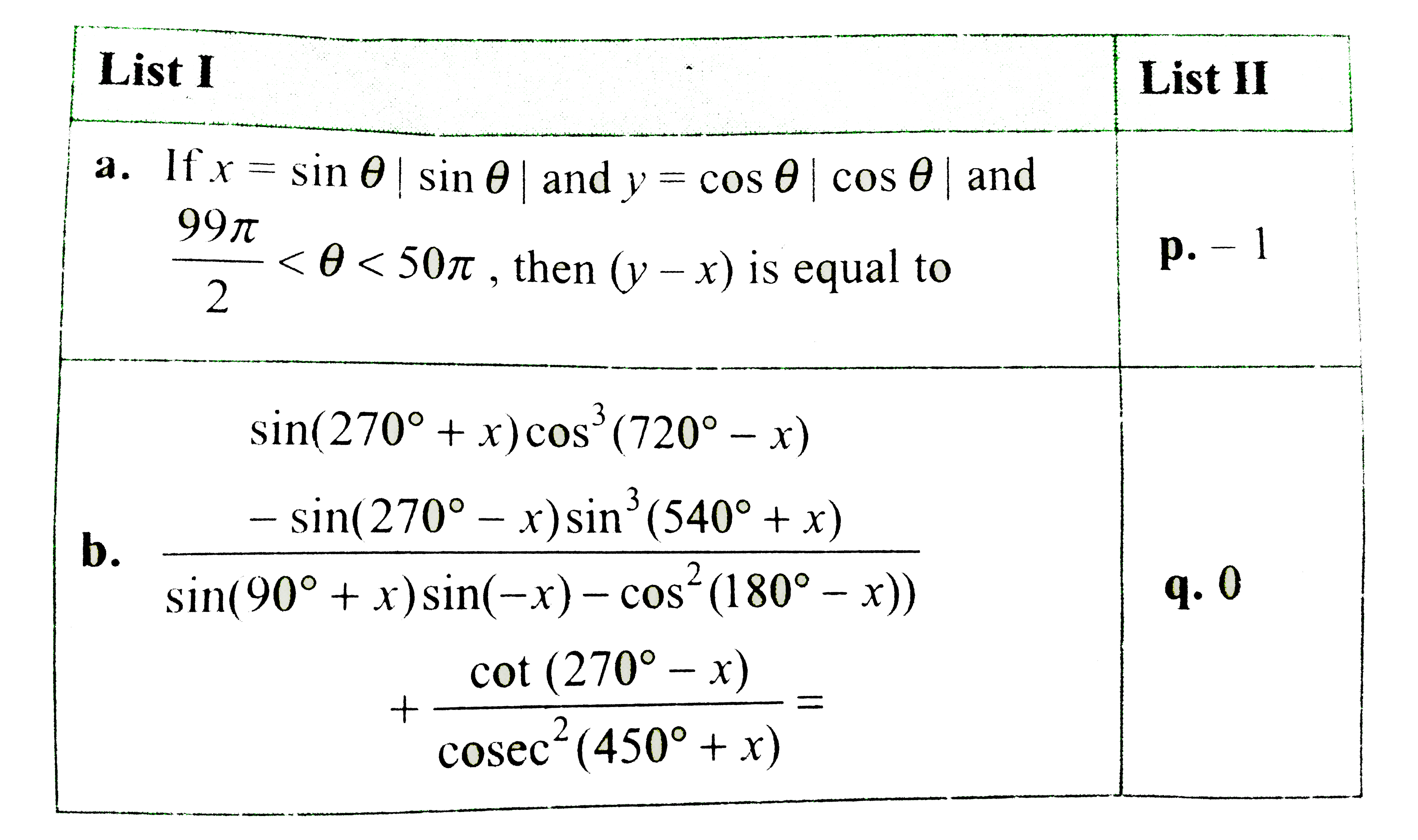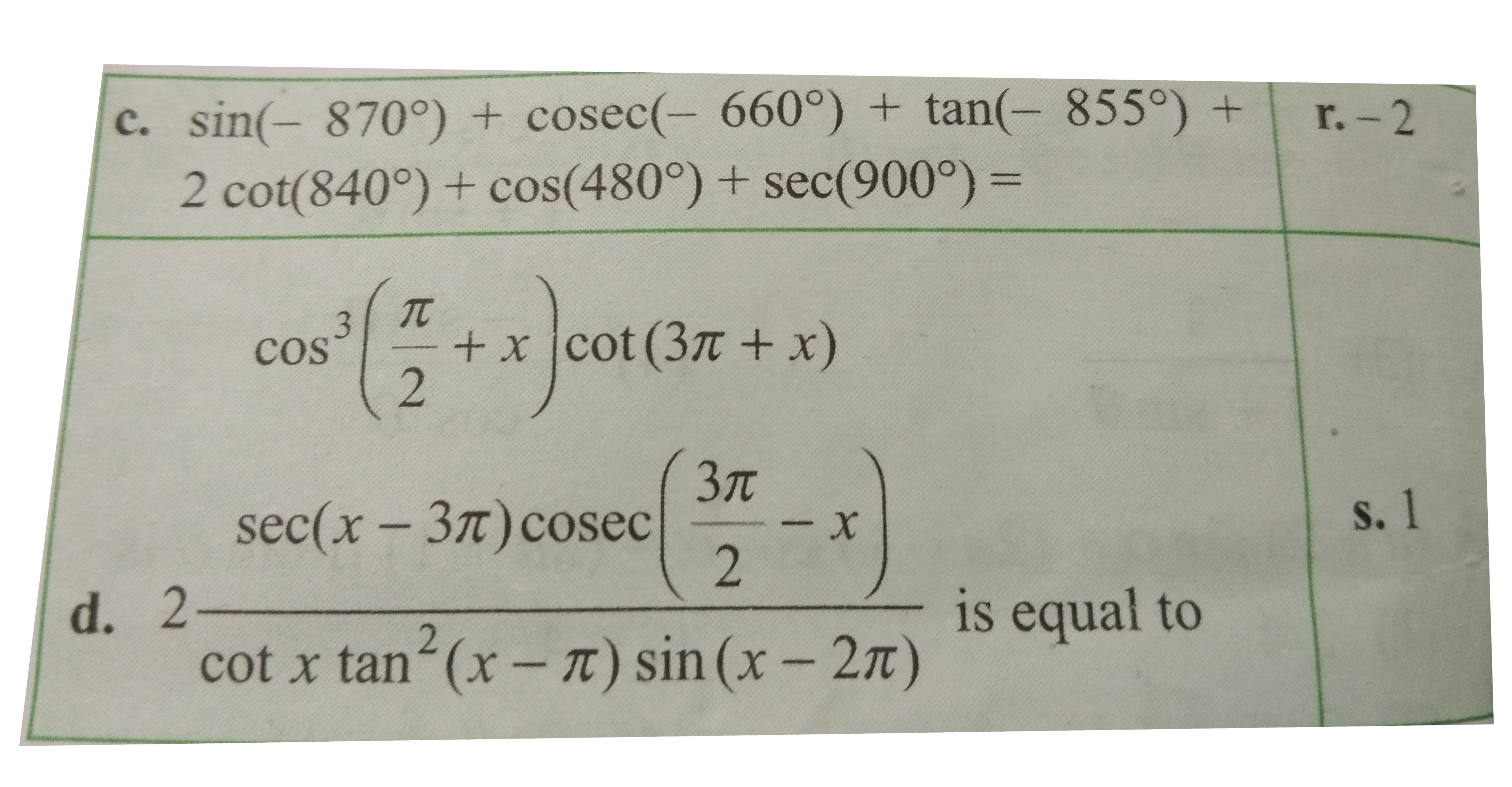If 0<ϕ<π2,x=∞∑n=0cos2nϕ,y∞∑n=0sin2nϕandz=∞∑n=0cos2nϕsin2nϕ, then Solution in Tamil
xyz=xz+y
xyz=xy+z
xyz=x+y+z
xyz=yz+x
The correct Answer is:B, C
All are infinte geometric progression with common ratio lt 1
x=11−cos2ϕ=1sin2ϕ,y=11−sin2ϕ=1cos2ϕ,
z=11−cos2ϕsin2ϕ
Now, xy+z=1sin2ϕcos2ϕ+11−sin2ϕcos2ϕ
=1sin2ϕcos2ϕ(1−sin2ϕcos2ϕ)
orxy+z=xyz...(i)
Clearly, x+y=sin2ϕ+cos2ϕsin2ϕcos2ϕ=xy
∴x+y+z=xyz [using Eq. (i)]
Topper's Solved these Questions
- TRIGONOMETRIC FUNCTIONS BOOK - CENGAGECHAPTER - TRIGONOMETRIC FUNCTIONS EXERCISE - Exercise (Comprehension)
11 Videos
- TRIGONOMETRIC FUNCTIONS BOOK - CENGAGECHAPTER - TRIGONOMETRIC FUNCTIONS EXERCISE - Exercise (Matrix)
3 Videos
- TRIGONOMETRIC FUNCTIONS BOOK - CENGAGECHAPTER - TRIGONOMETRIC FUNCTIONS EXERCISE - Exercise (Single)
57 Videos
- TRIGONOMETRIC EQUATIONSBOOK - CENGAGECHAPTER - TRIGONOMETRIC EQUATIONSEXERCISE - Archives (Matrix Match Type)
1 Videos
- TRIGONOMETRIC RATIOS AND TRANSFORMATION FORMULASBOOK - CENGAGECHAPTER - TRIGONOMETRIC RATIOS AND TRANSFORMATION FORMULASEXERCISE - Matrix Match Type
1 Videos
Similar Questions
Let us consider the equation cos4xa+sin4xb=1a+b,x∈[0,π2],a,b>0
The value of sin2x in terms of a and b is
View Solution

View SolutionIf 5tanθ=4, then 5sinθ−3cosθ5sinθ+2cosθ is equal to 0 (b) 1 (c) 16 (d) 6
View SolutionFind the derivative of y=tan−12x3
View SolutionRefer to the following diagram :

Column IColumn IIa.Collinear vectorsp.→ab.Coinitial vectorsq.→bc.Equal vectorsr.→cd.Unlike vectors (same initial point)s.→d
View SolutionIf x=∞∑n=0cos2nθ,y=∞∑n=0sin2nφ,z=∞∑n=0cos2nθsin2nφ,where0<θ,φ<π/2 prove that xz+yz−z=xy.
View Solutionlet 0
View SolutionIf 0
View SolutionIf x=∞∑n=0cos2nθ,y=∞∑n=osin2nθ,z=∞∑n=0cos2nθ.sin2nθand0<θ<π2 then-
View SolutionIf 0 <ϕ<π/2,andx=∞∑n=0cos2nϕ,y=∞∑n=0sin2nϕandz=∞∑n=0cos2nϕsin2nϕ,then
View Solution0<ϕ<π2 के लिए , यदि x=Σ∝π=0cos2nϕ,y=Σ∝n=0sin2nϕ,z=Σ∝n=0cos2nϕsin2nϕ हो , तब
View SolutionFor 0<ϕ≤π/2, if :
x=∞∑n=0cos2nϕ,y=∞∑n=0sin2nϕ,
z=∞∑n=0cos2nsin2nϕ, then :
View SolutionIf 0<ϕ<π2,x=∞∑n=0cos2nϕ,y∞∑n=0sin2nϕandz=∞∑n=0cos2nϕsin2nϕ, then
View Solution0≤ϕ<π2 के लिए यदि x=∞∑n=0cos2nϕ,y=∞∑n=0sin2nϕ,z=∞∑n=0cos2nϕsin2nϕतब
View Solution0ltphiltpi//2 For if x=sum_(n=0)^(oo)cos^(2n)phi,y=sum_(n=0)^(oo)sin^(2n)phi And z=sum_(n=0)^(oo)cos^(2n)phisin^(2n)phi Then xyz =
View SolutionIf 0<θ,ϕ<π2,x=∞∑n=0cos2nθ,y=∞∑n=0sin2nϕ and z=∞∑n=0cos2nθ⋅sin2nϕ then :
View Solution
